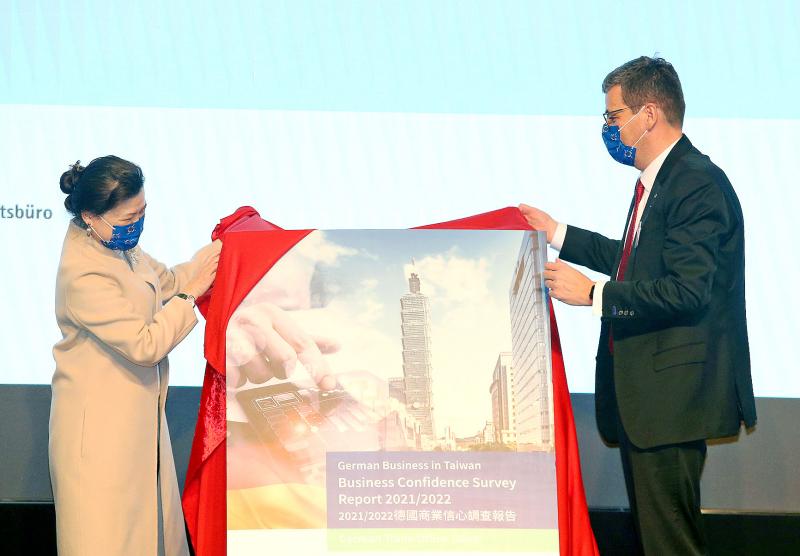A record number of German companies operating in Taiwan expect turnover to increase this year, although profit expectations were relatively low, an annual survey by the German Trade Office Taipei showed yesterday.
The survey showed that nearly 65 percent of German companies expect business to improve this year after 81.6 percent met their target last year and well-established firms continued to grow, the office said.
The survey, which was conducted among 251 companies from Dec. 6 last year to Jan. 18, showed that 28.8 percent generated revenue of NT$250 million to NT$1 billion (US$8.97 million to US$35.87 million) in the past few years, an increase of 9.6 percentage points from 2019.

Photo: CNA
It said that 21.9 percent reported revenue in excess of NT$1 billion, up from 19.2 percent in 2019.
Sixty-one percent of the firms said that they expect Taiwan’s economy to continue to improve this year, while 63.1 percent forecast the same for their own companies, the data showed.
Long-term commitment to Taiwan remains high among German companies, with 84.2 percent of respondents having established a presence more than five years ago, the survey said.
However, there are not many newcomers, which might indicate a decline in market entry appeal, it said.
“We recommend keeping a close eye on this trend and conducting further investigation,” German Trade Office Taipei Executive Director Axel Limberg said.
Travel restrictions and quarantine measures in Taiwan amid the COVID-19 pandemic have negatively affected business operations, weakening demand for products and services, and forcing cancelations of events, the office said.
German companies are not spared from the global economic slowdown and supply chain disruptions, it said, adding that 69.7 percent of respondents to the survey were affected by bottlenecks last year.
Negative effects might persist this year, it said.
The survey said that Taiwan’s domestic policy issues gained importance among German firms, with 34.2 percent expressing concern over energy transition and 32.9 percent mentioning digitalization.
Effective implementation of policies would become critical for German businesses to succeed in Taiwan, it said.

South Korea’s equity benchmark yesterday crossed a new milestone just a month after surpassing the once-unthinkable 5,000 mark as surging global memory demand powers the country’s biggest chipmakers. The KOSPI advanced as much as 2.6 percent to a record 6,123, with Samsung Electronics Co and SK Hynix Inc each gaining more than 2 percent. With the benchmark now up 45 percent this year, South Korea’s stock market capitalization has also moved past France’s, following last month’s overtaking of Germany’s. Long overlooked by foreign funds, despite being undervalued, South Korean stocks have now emerged as clear winners in the global market. The so-called “artificial intelligence

NEW IDENTITY: Known for its software, India has expanded into hardware, with its semiconductor industry growing from US$38bn in 2023 to US$45bn to US$50bn India on Saturday inaugurated its first semiconductor assembly and test facility, a milestone in the government’s push to reduce dependence on foreign chipmakers and stake a claim in a sector dominated by China. Indian Prime Minister Narendra Modi opened US firm Micron Technology Inc’s semiconductor assembly, test and packaging unit in his home state of Gujarat, hailing the “dawn of a new era” for India’s technology ambitions. “When young Indians look back in the future, they will see this decade as the turning point in our tech future,” Modi told the event, which was broadcast on his YouTube channel. The plant would convert

‘SEISMIC SHIFT’: The researcher forecast there would be about 1.1 billion mobile shipments this year, down from 1.26 billion the prior year and erasing years of gains The global smartphone market is expected to contract 12.9 percent this year due to the unprecedented memorychip shortage, marking “a crisis like no other,” researcher International Data Corp (IDC) said. The new forecast, a dramatic revision down from earlier estimates, gives the latest accounting of the ongoing memory crunch that is affecting every corner of the electronics industry. The demand for advanced memory to power artificial intelligence (AI) tasks has drained global supply until well into next year and jeopardizes the business model of many smartphone makers. IDC forecast about 1.1 billion mobile shipments this year, down from 1.26 billion the prior

People stand in a Pokemon store in Tokyo on Thursday. One of the world highest-grossing franchises is celebrated its 30th anniversary yesterday.